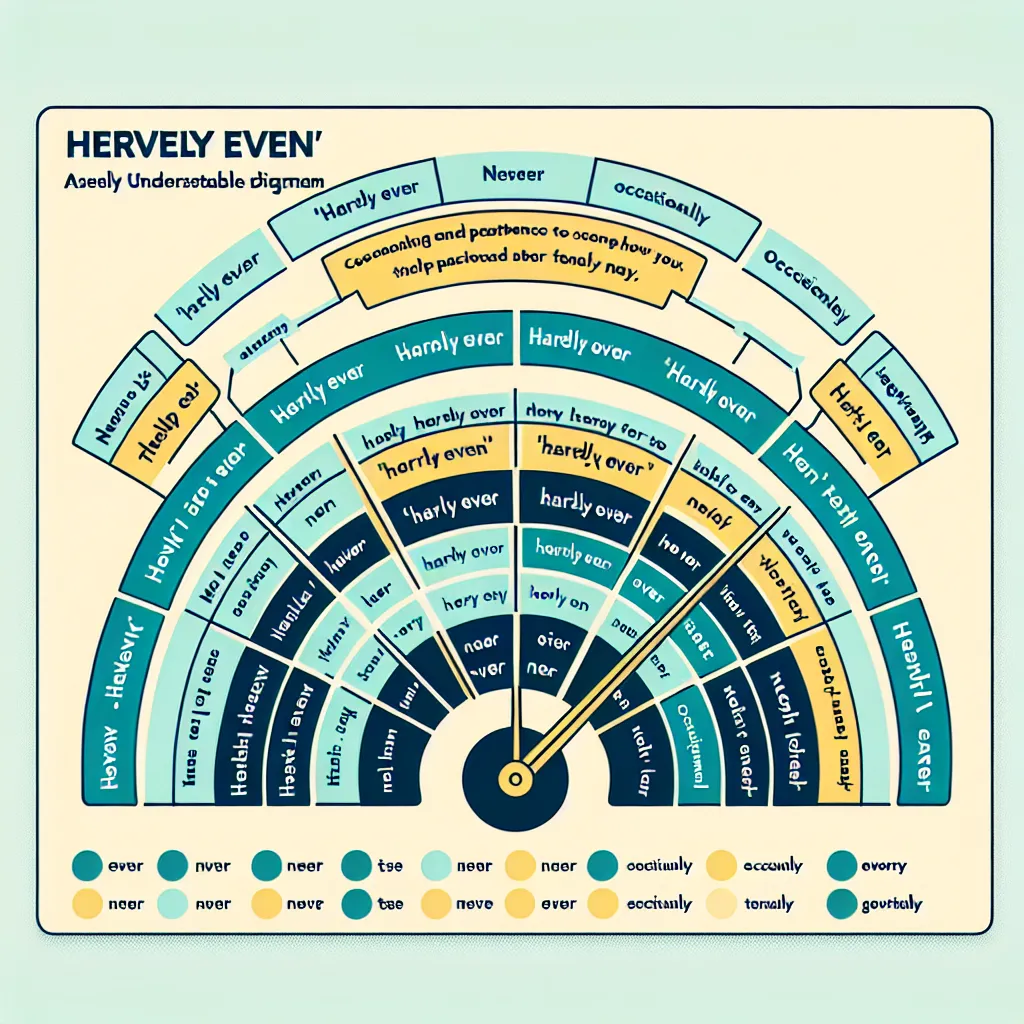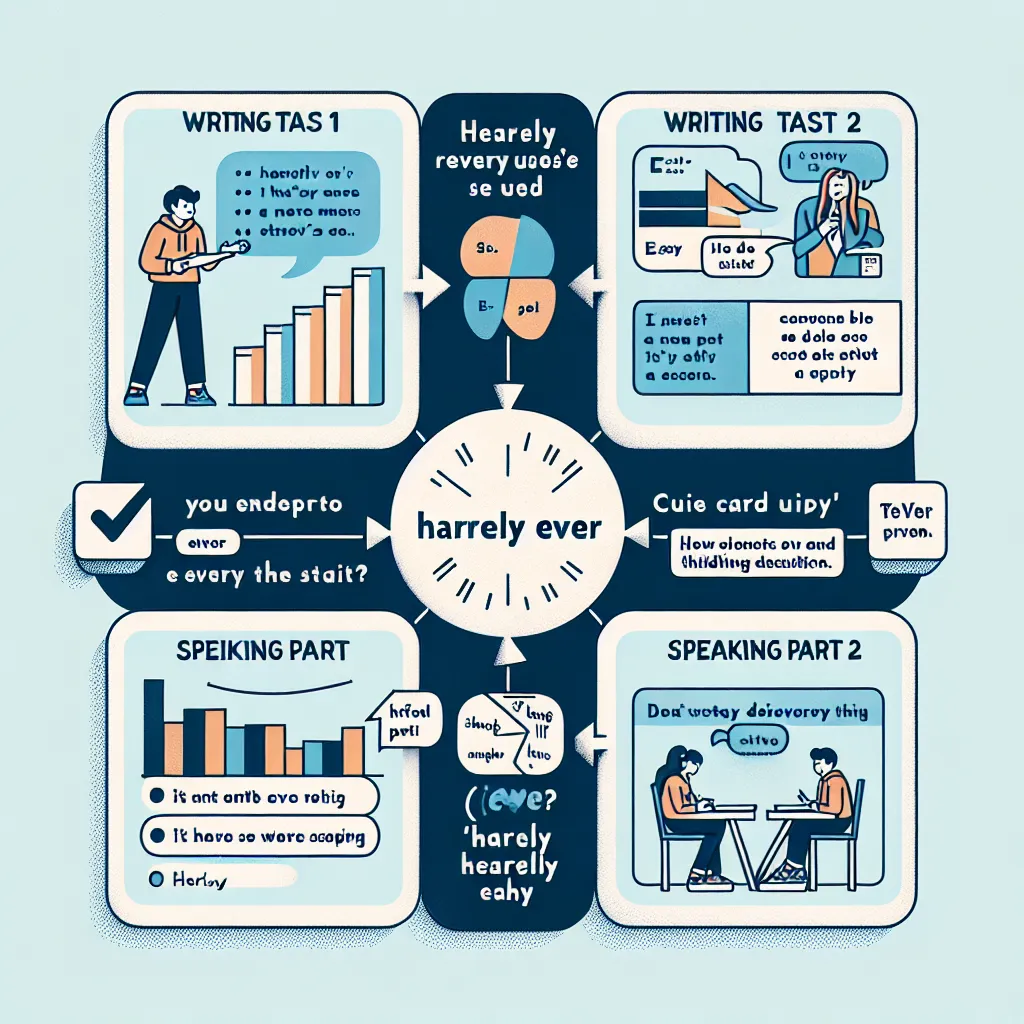Adverbial phrases with “hardly ever” are essential components in English grammar, frequently appearing in IELTS exams. These phrases express the rarity of an action or event, adding nuance and precision to your language. Understanding and using them correctly can significantly enhance your IELTS score across all sections of the test.
Nội dung bài viết
- Understanding “Hardly Ever” in Context
- Grammar and Usage in IELTS
- Formula and Structure
- Application in IELTS Writing
- IELTS Speaking Examples
- Advanced Usage for Higher Band Scores
- Common Mistakes to Avoid
- Practical Application in IELTS Tasks
- Writing Task 1
- Writing Task 2
- Speaking Part 2
- Speaking Part 3
- Conclusion
Understanding “Hardly Ever” in Context
“Hardly ever” is an adverb of frequency that means “almost never” or “very rarely.” It’s positioned between “never” and “occasionally” on the frequency scale. In IELTS, using this phrase accurately demonstrates a sophisticated grasp of English and can boost your score in both speaking and writing tasks.
Examples:
- I hardly ever eat fast food. (Simple present tense)
- She has hardly ever traveled abroad. (Present perfect tense)
- They hardly ever went to the cinema when they were younger. (Simple past tense)
 Adverbial Phrases with Hardly Ever
Adverbial Phrases with Hardly Ever
Grammar and Usage in IELTS
Formula and Structure
The basic structure for using “hardly ever” is:
Subject + hardly ever + verb (base form) + object/complement
It’s crucial to note that “hardly ever” is considered a negative adverb, so it follows the same rules as other negative adverbs in sentence structure.
Application in IELTS Writing
In IELTS Writing Task 2, using “hardly ever” can add sophistication to your essay. For example:
“In today’s digital age, people hardly ever write letters by hand. This shift in communication methods has led to a decline in penmanship skills.”
Analysis: This sentence demonstrates a high level of vocabulary and grammatical accuracy, likely to contribute to a band 7 or above in the IELTS writing criteria.
IELTS Speaking Examples
- “I hardly ever watch television these days. I prefer streaming services.”
- “My grandfather hardly ever uses his smartphone. He’s not very tech-savvy.”
These examples show how to naturally incorporate the phrase into conversation, which is essential for scoring well in the IELTS Speaking test.
Advanced Usage for Higher Band Scores
To aim for band 8 and above, consider these more complex structures:
- With modal verbs: “You should hardly ever need to recharge this device.”
- In passive voice: “This road is hardly ever used by locals.”
- With perfect continuous tenses: “I have hardly ever been studying for less than two hours a day since I started preparing for IELTS.”
Comparing band scores:
- Band 6: “I don’t watch TV much.”
- Band 7: “I hardly ever watch television.”
- Band 8+: “I’ve hardly ever found myself inclined to watch television since I began my IELTS preparation.”
The progression shows increasing complexity and precision in language use.
Common Mistakes to Avoid
-
Double negatives: ❌ “I hardly ever don’t go to the gym.”
Correct: ✅ “I hardly ever go to the gym.” -
Wrong word order: ❌ “I ever hardly see him.”
Correct: ✅ “I hardly ever see him.” -
Using with ‘very’: ❌ “I very hardly ever eat meat.”
Correct: ✅ “I hardly ever eat meat.” or “I very rarely eat meat.” -
Confusing with ‘never’: While “hardly ever” and “never” are close in meaning, they’re not interchangeable. “Hardly ever” allows for rare occurrences, while “never” is absolute.
Practical Application in IELTS Tasks
Writing Task 1
In describing trends:
“The graph shows that people aged 65 and over hardly ever participated in extreme sports between 1990 and 2020.”
Writing Task 2
In discussing social issues:
“Despite numerous awareness campaigns, people hardly ever consider the long-term environmental impact of their daily choices.”
Speaking Part 2
In a topic about habits:
“I’d like to talk about reading, which is something I hardly ever did as a child. However, as I grew older…”
Speaking Part 3
In discussing societal changes:
“Nowadays, people hardly ever write letters by hand. This shift has both positive and negative implications for personal communication.”
 IELTS Tasks with Hardly Ever
IELTS Tasks with Hardly Ever
Conclusion
Mastering adverbial phrases with “hardly ever” can significantly enhance your IELTS performance. Remember to use it to express rarity, maintain correct sentence structure, and avoid common mistakes. Practice incorporating this phrase into your writing and speaking to achieve a more sophisticated level of English expression.
For further practice, try using “hardly ever” in sentences about technology use, environmental habits, or changes in society over time – all common IELTS themes. The more you integrate this phrase naturally into your language, the more confident and proficient you’ll become in your IELTS preparation and performance.
